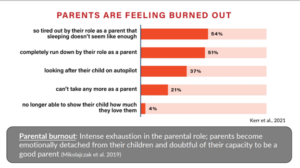EDITOR’S CORNER
I often attend webinars related to mental health, especially about youth and families. About a month ago, I attended one on “The Pandemic’s Impact on Parents.” It was sponsored by SciLine, which offers press briefings with groups of scientific experts on topics in the news.
The webinar’s announcement blared a familiar theme: “COVID-19 has challenged parents to manage their own health, the health of their children, their work, and their finances in a setting of unprecedented risk and economic pressure.” And if you, the caregiver, are struggling with the psychological effects of extreme stressors like these, it’s that much harder to deal with a struggling kid.
So I thought it might be helpful to share the findings from two of the three expert presentations about what is known, based on research, about the effects of pandemic-induced stress and burnout on parents—and how stress, decision fatigue, and other factors may influence the choices parents make about their children’s health.
Risk Decision Fatigue
First, Dr. Brian Zikmund-Fisher, a Professor of Health Behavior and Health Education at the University of Michigan-Ann Arbor talked about factors affecting parents’ decisions around COVID risks, and how that leads to what he called “risk decision fatigue.” According to Zikmund-Fisher, families have faced a variety of risks since the pandemic began more than two years ago: At first, we had to assess the relative dangers presented by a strange and scary virus, new rules, and conflicting information. Today, adapting and armed with more tools to protect themselves, families still need to weigh the remaining uncertainties and trade-offs when it comes to protecting their kids and themselves as they go about their lives.
Parents have to make daily risk choices, he said, and that’s hard, especially when the situation is constantly changing (school mask mandates, new disease variants). Choices are driven by values, but what happens when those values conflict (working from home, I need to get the job done, versus my child needs my attention)? Add to this that parents often feel they can’t afford to make the wrong call—but the right answer is seldom clear. All of that creates decision fatigue.
The solution? According to Zikmund-Fisher, realize there are no absolutes when it comes to managing threats to your kids and family. “There’s going to be some risks that we face no matter what we do. And the rational piece here is just to acknowledge…that there is a trade-off and to try as best we can to weigh things against each other” according to our personal values.
Burnout
Later, Dr. Margaret Kerr, an Assistant Professor of Human Development and Family Studies at the University of Wisconsin-Madison, talked about COVID’s impact on parental mental health. Her 2021 research findings will likely be no surprise: The new stressors of health risks, income loss, and conflicting priorities led to increased depression and anxiety in about 40% of parents surveyed. She also pointed to an American Psychological Society survey this year that found 70% of parents say COVID remains a daily stressor.
This, in turn, has led to a specific form of burnout, a type of exhaustion in which “parents become emotionally detached from their children and doubtful of their capacity to be a good parent.” Those who were locked down longer, forced to home school, lacked support from their partner, experienced financial hardship, or came down with COVID themselves had greater levels of parental burnout. And the impact was also worse on women, low-income parents, and people of color. This type of burnout has been shown to lead to “serious consequences,” Kerr said, including child abuse and neglect along with suicidality in parents.

There were some “silver linings,” however. When Kerr and her research team asked parents about how they were feeling, they found that while negative emotions like worry and anger increased because of the pandemic, positive emotions such as closeness to their children and gratitude also increased.
Social and Personal Solutions
Kerr believes the crisis has drawn much-needed attention to how society as a whole can better support parents. Top of her list: access to paid leave from work to care for one’s family, which research has shown is effective. As she put it, “Mental health and childcare are intimately intertwined.”
For me, the bottom line of both presentations was that society needs to invest more in helping parents. But also that parents need to invest a little more faith in their own instincts—and in their children’s resilience. And to make time for self-care—ideas neatly expressed in a recent article in The Atlantic, “How to Quit Intensive Parenting.” The article’s author is childcare policy expert Elliot Haspel, an advocate for universal free childcare. That sounds like something that would alleviate a great deal of parental stress, with or without a pandemic.
If you want to learn more about COVID’s effect on parenting, you can watch the whole webinar here. And please comment on whether these findings resonate with you.
—Miranda Spencer, Family Resources Editor
***














